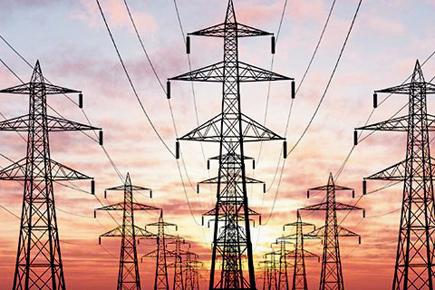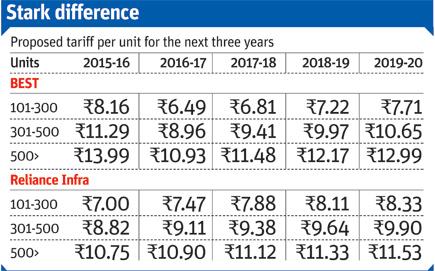While BEST decides to withdraw TDLR imposed on power bills in the island city to recover losses, reducing individual bills by 26%, RInfra proposes tariff hike per unit in the suburbs

As Shiv Sena, BJP and Congress are bickering amongst themselves to take credit for pressurising the Brihanmumbai Electric Supply and Transport (BEST) into revoking Transport Deficit Loss Recovery (TDLR) from the electricity bills of the island city residents, 29 lakh Mumbaikars from the western suburbs (Bandra to Bhayandar) are likely to pay through their noses if the proposed tariff hike by RInfra comes into effect. Upon implementation, the overall hike in bills for RInfra customers will be anywhere between two to five per cent for the next three years.
ADVERTISEMENT
Also Read: Maharashtra Government assures help to BEST, but where will the money come from?

The Maharashtra Electricity Regulatory Commission (MERC) yesterday held a hearing at Rangsharda auditorium in Bandra, seeking public opinion on the proposed hike. Unfortunately, the initiative received a lukewarm response. The massive auditorium was sparsely crowded and most of those present inside were either MERC officers or representatives of various power distributors. Besides a handful of AAP activists, not a single corporator or an MLA attended the meeting.
The absence of politicos at a public hearing surprised the RInfra representatives. One of them claimed that in the past, none of the parties would miss out on such an opportunity to hog public sympathy.
Yesterday’s meeting lasted for just 90 minutes, during which RInfra proposed tariff hike without attracting much resistance from the public or politicos.
Plugging the leak
Commenting on the undertaking’s decision to withdraw TDLR, a senior BEST officer said a public notice for the same would be issued in the coming week. “This notice will intimate people about the new tariff, minus the TDLR. A public hearing in this regard is expected in May. There are about 30,000 high-end consumers who could migrate to Tata Power, which has been marketing itself as a cheaper alternative to BEST. So we are forced to scrap TDLR to rationalise the tariffs. Besides, we made a couple of suggestions to help the BEST recover losses: levying ‘electricity duty’ across Mumbai and introduction of ‘transport cess’ in property tax,” the officer added.
Read Story: Mumbai: BEST has failed to recover over Rs 1000cr outstanding power dues
Sources claimed the withdrawal of TDLR in electricity bills would reduce the overall bill amounts of 10 lakh BEST power customers by 26 per cent, which in turn will hamper the annual recovery of about Rs 700 crore. They claimed the loss incurred by the transport division would touch Rs 6,800 crore by 2019-20, thus worsening the situation.
Also, the undertaking has proposed changes to its fare slabs so that long-distance commuters save on their journeys. With the addition of new slabs at 8 km, 12 km and 20 km, fares will come down by Rs 2 to R5. Officials said this will attract more commuters and will generate additional revenue.
Cutting short
Besides proposing electricity duty and transport cess to recover losses in absence of TDLR, the undertaking is planning to terminate 52 routes, including two routes for AC services. Best authorities are also mulling a change in the timetable and altering existing routes.
“Talks are on with the state and the BMC to give us money against TDLR. We have also proposed ‘Happy Hours’ for commuters from 11 am to 5 pm, during which 50 per cent discount will be offered on bus passes,” said M Mithbaokar, chairperson, BEST Committee. He belongs to the BJP.
Credit hunt
Taking credit for the withdrawal of TDLR, erstwhile BEST chairperson A Dudhvadkar of Shiv Sena stated that he was instrumental in ensuring the revocation and had even met Chief Minister Devendra Fadnavis in this regard.
While Congress member Ravi Raja claimed that the party has been against TDLR since its introduction. “The BMC should pay at least Rs 300 crore to Rs 400 crore from its kitty to offset TDLR losses,” he said.
Sources claimed that the civic body is reluctant in extending a helping hand to the ailing undertaking and even if it does, the aid will come with riders.

 Subscribe today by clicking the link and stay updated with the latest news!" Click here!
Subscribe today by clicking the link and stay updated with the latest news!" Click here!






